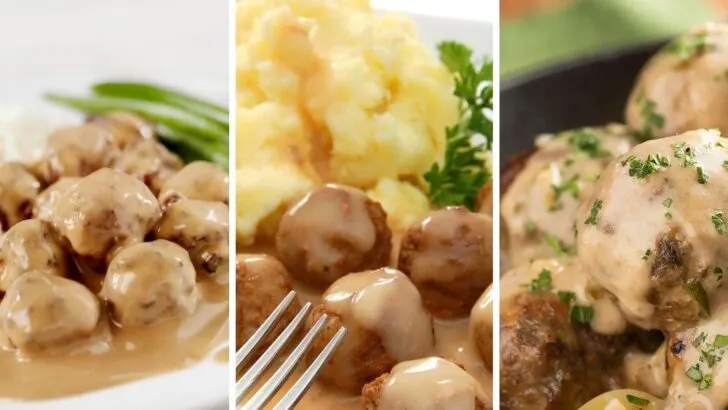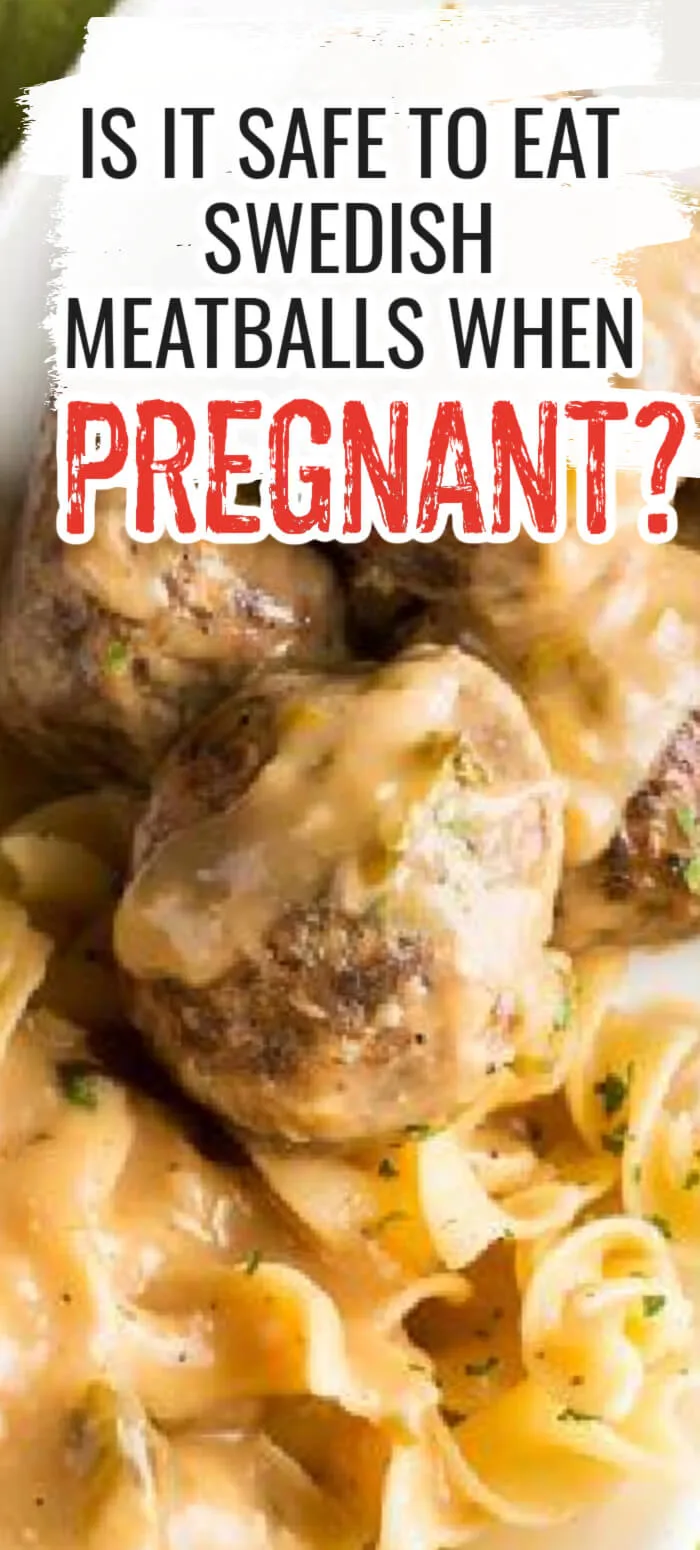Updated May 8, 2023
Meatballs are a popular dish all over the world.
Swedish meatballs are especially loved, but can you eat Swedish meatballs when pregnant?
In this article, we will answer that question and provide some safety tips for pregnant women who want to enjoy this dish.
We will also include some delicious recipes for Swedish meatballs so you can enjoy them whether you’re pregnant or not!

Can you eat Swedish meatballs when pregnant?
The answer is yes, you can eat Swedish meatballs while pregnant, but there are a few caveats.
Swedish meatballs are a safe and healthy choice for pregnant women.
The meat is cooked until it is very well done, so there is little risk of food poisoning.
The gravy is made with milk and flour, which are both safe to eat during pregnancy.
And when served with a side of mashed or boiled potatoes provide plenty of vitamins and minerals.
So here is what you need to keep in mind before digging into a plate of Swedish meatballs.
You need to cook the meatballs all the way through.
No medium-rare meatballs should be eaten during pregnancy.
Raw or undercooked meat can contain harmful bacteria that can make you sick.
Cook your meatballs until they are at least 165 degrees Fahrenheit.
It is also important to avoid any sauces or gravies that are made with alcohol.
Alcohol can cross the placenta and harm your baby.
According to the CDC, There is no known safe amount of alcohol you can consume during pregnancy.
Most Swedish meatball gravy recipes are made with heavy cream, cream soups, or milk.
Sometimes all three are used!
Dairy products are often high in calories and fat so enjoy them in moderation.
They may also make your morning sickness worse or cause heartburn during pregnancy.
Choosing lower-fat dairy products is a great choice while you are pregnant and may make eating Swedish meatballs during your pregnancy a more enjoyable experience.
You can use frozen Swedish meatballs that are pre-cooked and you only need to heat them through completely.

Now that we’ve covered the safety tips, let’s get to the recipes!
This first recipe is for a classic Swedish meatball dish. You will need:
Ground beef
Bread crumbs
Onion
Egg
Salt
Pepper
Allspice
Butter
Beef broth
Flour
Milk
To make the meatballs, mix together the ground beef, bread crumbs, onion, egg, salt, pepper, and allspice.
Form into balls and then brown in a large skillet over medium heat. Once browned, remove from the skillet and set aside.
To make the gravy, melt butter in the same skillet you used to brown the meatballs.
Stir in flour and then slowly add beef broth and milk, whisking until smooth.
Return the meatballs to the skillet and cook until heated through. Serve over cooked rice, noodles, or potatoes.
This next recipe is for a unique take on Swedish meatballs.
These meatballs are made with pork and beef, and they’re flavored with ginger, nutmeg, and cloves.
You will need:
Ground pork
Ground beef
Bread crumbs
Egg
Ginger
Nutmeg
Cloves
Salt
Pepper
Butter
Cream of mushroom soup
Milk
To make the meatballs, mix together the ground pork, ground beef, bread crumbs, egg, ginger, nutmeg, cloves, salt, and pepper.
Form into balls and then brown in a large skillet over medium heat.
Once browned, remove from the skillet and set aside.
To make the gravy, melt butter in the same skillet you used to brown the meatballs.
Stir in cream of mushroom soup and milk, whisking until smooth.
Return the meatballs to the skillet and cook until heated through. Serve over cooked rice, noodles, or potatoes.
Can you eat Ikea Swedish meatballs when pregnant?
Yes! You can eat Ikea Swedish meatballs while pregnant.
There’s no need to avoid Ikea Swedish meatballs when you’re pregnant.
In fact, they can be a good source of protein and other nutrients.
However, it’s important to cook them thoroughly to reduce the risk of foodborne illness.
Pregnant women are more susceptible to foodborne illnesses, so it’s important to take extra precautions when handling and cooking meat.
When cooking Ikea Swedish meatballs, be sure to cook them until they’re well done.
If you’re unsure, use a food thermometer to check that the internal temperature is at least 160 degrees Fahrenheit.
Once they’re cooked, enjoy your delicious and nutritious meal!
You can also enjoy them hot and fresh in the store!
They serve their Swedish meatballs over mashed potatoes.
An excellent choice if you are craving comfort food.
Ikea has an adorable selection of baby things for sale, so you can combine a bit of baby shopping with a delicious Swedish meatball lunch guilt-free!
Can you eat pork meatballs when pregnant?
Yes, you can eat pork meatballs when pregnant.
Pork and turkey meatballs are excellent alternatives to beef consumption during pregnancy.
Pork is lower in fat and calories than beef making it a healthier choice.
Pork meatballs need to be cooked thoroughly.
You can use pork or turkey meatballs in place of beef meatballs in your Swedish meatball recipe.
Can you eat Swedish meatballs and noodles while pregnant?
Yes! That is how my family always ate them growing up and how my mom still serves them.
The noodles used most commonly are egg noodles which are safe for you to eat during pregnancy.
I prefer mashed potatoes and some people serve Swedish meatballs over rice or with a side of warm crusty bread too.
You can serve them with the carb of your own choice.

Foodborne Illness and Pregnancy
We need to talk briefly about food-borne illnesses and pregnancy.
You are more susceptible to food poisoning during pregnancy.
Our immune systems are slightly suppressed during pregnancy which helps us carry our babies to term, but does put us more at risk of contracting illnesses from viruses, bacteria, and molds.
Most Common Food-Borne Illnesses:
- Listeria
- Salmonella
- E Coli
- Mold
- Campylobacter
- Botulism
These pathogenic bacteria are often found in foods that are not kept at the proper temperature, stored improperly, or that are undercooked.
To reduce your risk of foodborne illness during pregnancy you want to pay close attention to how you prepare, cook and store the foods you eat.
There are some foods to not eat when pregnant:
- Foods that are unpasteurized– certain types of cheese like soft cheeses, Brie, and Blue Cheese
- Certain types of fish– shark, swordfish, anything high in mercury
- Raw eggs including hollandaise sauce, homemade mayonnaise, homemade eggnog, and runny eggs.
- Undercooked meats– lunch meats. Deli meats should be heated thoroughly before consumption.
- Hot foods that are not “hot”, avoid hot foods that have been sitting out without a warming source. Same for foods that should be eaten cold. If no ice or refrigeration source is keeping the food cold, take a pass.
- Caffeine– soda, chocolate, and energy drinks. (Limit your caffeine to less than 200 mg a day)
- Herbal Teas (There are so many ingredients in herbal teas so it is best to avoid them simply. Green tea is OK.)
- Alcohol: There is no known safe amount of alcohol during pregnancy. Avoid sauces made with alcohol, desserts made with alcohol, and all alcoholic beverages.
Here are some Foods you should eat during pregnancy:
- Avocado
- Oatmeal
- Pinto Beans
- Black beans
- Arugula
- Bananas
- Dark Green Leafy Vegetables
- Brussel sprouts
- Carrots
- Green Beans
- Eggs
- Lean Meats
- Apples
- Oranges
- Salmon
- Shrimp
What should a pregnant woman eat daily?
A pregnant woman needs to consume various nutrients daily to support her health and the development of her baby.
Protein is essential for building new tissue and can be found in meat, poultry, fish, legumes, and eggs.
Swedish meatballs have plenty of protein and iron.
Calcium is necessary for strong bones and teeth and is especially important during the third trimester when the baby’s skeleton is rapidly developing.
Pregnant women should aim to get 1000 mg of calcium per day from low-fat dairy products such as milk, yogurt, and cheese.
Iron is also important for the formation of new blood cells, and pregnant women need about 27 mg of iron per day.
Tips for eating healthy during pregnancy:
Eating healthily during pregnancy is important for both the mother and the baby.
Here are some tips to help make sure you are getting the nutrients you need:
- Eat a variety of fruits, vegetables, whole grains, and lean protein. This will help ensure you get the vitamins, minerals, and fiber you need.
- Avoid processed foods, sugary drinks, and excessive amounts of caffeine. These can all lead to unhealthy weight gain and other problems during pregnancy.
- Drink plenty of water. Staying hydrated is important for both your health and the baby’s health.
- Don’t skip meals. Eating small, frequent meals will help to keep your energy up and prevent you from overeating later on.
Final Thoughts
There’s nothing like a good old-fashioned Swedish meatball to make you feel all warm and fuzzy inside, and what could be more perfect for pregnant women than food that is both comforting and nutritious?
Swedish meatballs are made with ground beef or pork, bread crumbs, egg, onion, salt, and pepper, and they are usually served with boiled potatoes, lingonberry jam, and melted butter.
Swedish meatballs are safe to eat during pregnancy.
They are the perfect comfort food because they are hearty and filling.
And since they are packed with protein and iron, they are a great way to get the nutrients you need during pregnancy.
So next time you’re craving good old-fashioned comfort food or just need something to nibble on, give these delicious little meatballs a try – you won’t be disappointed!



